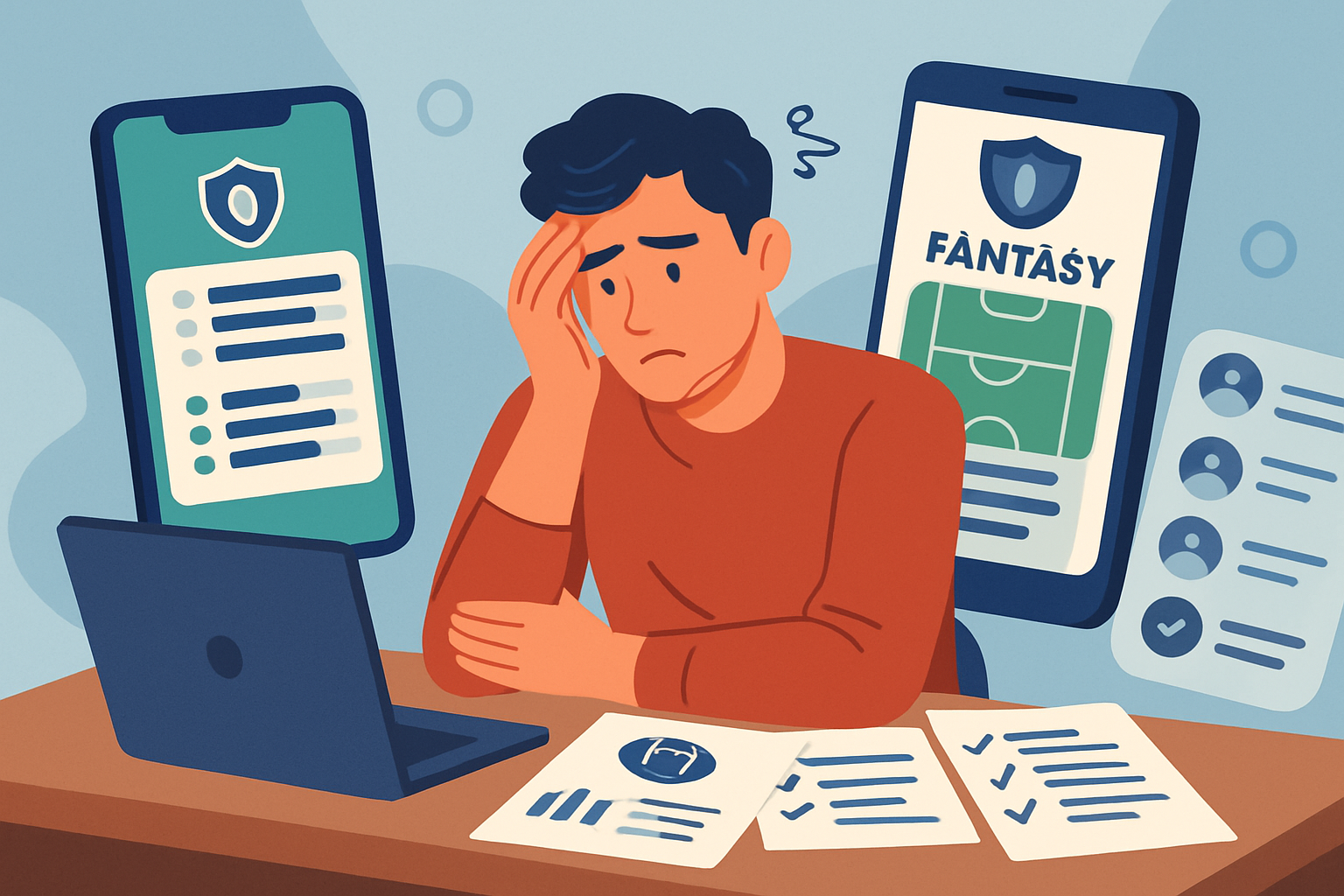Signs You Should Consider Quitting Fantasy Football

This guide helps you recognize when your beloved fantasy football pastime might be causing more headaches than highlights.
- Spot red flags that show fantasy football might be harming your mental well-being and straining your relationships.
- Dig into practical steps to dial back your fantasy football fix or take a graceful bow out entirely.
- Get a clear-eyed look at how your fantasy football obsession could be eating away at your wallet and stealing time.
- Discover refreshing ideas for healthier hobbies and activities that can gently nudge your personal growth in the right direction.
Fantasy football has really blossomed into a cultural sensation drawing millions of sports fans from all corners of the globe, yet the thought of quitting fantasy football rarely crosses the minds of those hooked by its fascinating mix of competition and strategy that pulls them into a lively and tight-knit community.
This guide takes a closer look at the telltale signs that it might be time to hang up your fantasy football cleats for a while. It dives into personal growth, mental health and the tricky art of juggling life’s many demands. Whether it’s feeling overwhelmed or struggling to carve out enough hours in the day or simply watching your enthusiasm wane.
A Quick and Friendly Dive into Fantasy Football
Fantasy football hands you the reins as a team manager and lets you pick real NFL players to craft your own virtual squad. How those players perform on the field translates directly into fantasy points that make or break your team's success each week. It’s a heady mix of strategy and must-make weekly calls on lineups and trades that keep you on your toes. Millions dive into fantasy football just for kicks but some leagues demand a surprising amount of time and emotional investment, especially when you’re battling friends or gunning for prizes.
Why People Often Play Fantasy Football and What They Truly Get Out of It
- Fantasy football is a fantastic way to strengthen social bonds and bring friends and family together over something everyone’s passionate about.
- It gets those gears turning and encourages players to dig into stats and craft smart strategies week after week.
- The game keeps fans hooked all season long and turns every matchup into a highlight worth looking forward to.
- Players savor the thrill of competition because it can be a real motivator and a rewarding experience.
- Jumping in often boosts your football smarts and sports analytics knowledge while letting fans see the game through a richer and more nuanced lens.
- For many, it’s a perfect way to kick back and relax while still giving their brain a little workout—kind of the best of both worlds.
Playing fantasy football often brings perks that go beyond simply winning or losing. It’s a great way for people to connect with each other and sharpen their wits while soaking up the thrills all season long. For many, the sense of community and good-natured competition adds an extra punch to their passion for football. Those who dive into the nitty-gritty of stats and game analysis often uncover richer insights into player performances and team strategies.
When It Might Just Be Time to Take a Breather from Fantasy Football
Although fantasy football has become a favorite pastime for many, it’s not always the perfect match for everyone. There are some clear signs that waving a pause flag might do you a world of good.
It’s like carrying a heavy backpack you can’t put down.
Where fantasy football starts to feel less like a fun pastime and more like a tedious chore.
Because all that time and those mood swings don’t go unnoticed.
To the point where work, family or other responsibilities begin to slip through the cracks.
Popping up thanks to league fees or side bets that seemed harmless at the time.
We’ve all been there biting our nails.
Which is a recipe for burnout.
Sometimes you just want to hit rewind.
Almost like throwing in the towel without realizing it.
Which in hindsight is usually not the best call.
Each sign peels back another layer revealing a deeper tug-of-war between your passion and wellbeing. Anxiety over fantasy football when it starts creeping into your work or casts a shadow over time with family and friends is usually a red flag that something’s off. Pouring too many hours into chasing stats or juggling rosters while letting rest and self-care slide can easily lead to burnout. It sneaks up faster than you’d think. And those league fees or bets? They can pile on financial stress that quickly drowns out the fun.

Mental Health and Emotional Well-being Factors to Keep in Mind (Because They Really Matter)
Fantasy football can be a fun way to keep your mind sharp and engaged, though I’ve noticed it can sometimes sneak up and feel a bit overwhelming or downright stressful. Those emotional rollercoasters from winning one week and losing the next tend to leave a mark on your mood more than you might expect.
- Spotting burnout can be tricky. It usually shows up as feeling wiped out or getting annoyed over the smallest things. Sometimes, you suddenly stop caring about what used to excite you.
- Grappling with anxiety and depression often sneaks in when the pressure to keep performing doesn’t let up. This makes everything feel heavier.
- Setting firm personal boundaries around how much time and emotional energy you spend managing fantasy worlds is key. It’s easier said than done but worth the effort.
- Reaching out to a professional or a trusted friend when these feelings take over or won’t quit can really make a difference. You’re definitely not alone in this.
"Fantasy football can be a lot of fun when you keep it in balance, but let’s be honest, it can sneakily turn stressful and even a bit compulsive if you don’t set some boundaries. I’ve found it really helps when players stay tuned in to their emotions and remember to put their mental well-being front and center." — Dr. Sarah Jennings, Sports Psychologist
Financial and Time Management Considerations You Really Need to Keep in Mind
Fantasy football often sneaks up on people with league fees and side bets plus tempting premium tools or apps that promise to improve your game. Throw in the hours spent digging into stats and managing your lineup and juggling chats with league mates. Suddenly it can pinch your wallet and eat away at your productivity more than you would expect.
| Commitment Aspect | Typical Time Investment | Typical Financial Cost | Impact on Responsibilities and Leisure |
|---|---|---|---|
| Weekly Lineup Management | Usually takes about 1 to 3 hours, give or take | Mostly free, but some leagues might charge up to $10 | Might nibble away at your hobby time or cut into moments you would rather spend with family |
| League Entry Fees | Not really applicable here | Typically runs between $20 and $100 or sometimes even more per season | These fees can sneak up on you and might tighten the belt for other spending |
| Side Bets and Wagers | Can vary quite a bit, often tacks on extra time managing things | Usually falls somewhere between $20 and $200 or higher depending on how high the stakes are | Has the potential to add some stress and, well, financial risk along for the ride |
| Research and Analysis | Around 2 to 5 hours a week, if you are serious about it | Costs for subscriptions or tools can add up | Might leave you a bit wiped out and steal some precious rest time |
| Communication and Trading | Generally clocks in at 1 to 2 hours each week | No direct costs here | Can occasionally intrude on your social life or work priorities |
| Watching Games for Intel | Varies widely, often several hours per week | No financial cost involved | Could put a damper on your flexibility when it comes to leisure time |
It’s a good idea to regularly take a step back and check if the time and money you’re pouring into fantasy football truly line up with your bigger values and priorities. You might find it useful to set up a budget or jot down a time log to get a clearer picture of just how much you’re really committing.
How to Decide When It is Time to Call It Quits Steps and Strategies That Actually Help
Choosing to step away from fantasy football is a personal decision that definitely benefits from a bit of soul-searching.
Pinpoint your personal reasons and the specific triggers that turn fantasy football from fun to a drag.
Be honest with yourself about how much time and emotional energy you’re actually pouring into the game. Sometimes we do not realize the toll until we stop and think.
Consider the social perks and pitfalls and brainstorm other ways to keep those friendships alive so it doesn’t feel like a chore.
Try out different hobbies, sports or creative outlets. There’s likely something out there that fits your vibe better.
Take a trial break and see what life feels like without the weekly stress of managing your roster.
Have an open chat with your league buddies about your decision to step back. Keeping those connections strong matters more than any game stats.
Once you’ve stepped away, focus your energy on self-care and activities that help you grow and fill your time in a positive and rewarding way.
Taking clear, proactive steps can really help you step away from fantasy football with confidence without feeling like you’re going it alone.
Clever Ways to Rebalance Your Fantasy Football Experience Without Throwing in the Towel
If you’re not quite ready to throw in the towel on fantasy football just yet, there are some down-to-earth ways to lighten the load and reclaim the reins on how deep you dive in. These tips are all about keeping the fun and camaraderie front and center.
- Cut back on the number of leagues you join to ease your time demands.
- Set clear time limits for managing your fantasy team each day or week.
- Steer clear of high-stakes bets or expensive league fees to keep financial stress down.
- Share team management duties with trusted friends or lean on automated lineup tools, so you’re not carrying the whole load solo.
- Use fantasy football apps with notifications to stay updated without breaking a sweat or missing a beat.
- Focus on enjoying the game and the camaraderie rather than competing too hard to lower emotional pressure.
Players usually strike a nice balance, keeping their fantasy football experience fun rather than turning it into a chore.
Real Stories About How Quitting Fantasy Football Made a Surprisingly Big Difference
A lot of individuals seem to stumble upon a fresh sense of balance and personal growth after stepping away from fantasy football for a while. One player shared that quitting gave them more quality time to reconnect with family and dust off some old hobbies, which in turn boosted their mental health and strengthened their relationships.
"Giving up fantasy football turned out to be one of the smartest moves I have ever made. It not only helped me reclaim my weekends but also brought me closer to the people who really matter, and, honestly, gave me a much-needed dose of peace of mind." — Mark S., former fantasy football enthusiast
These little experiences serve as a gentle reminder that hobbies should enrich our lives, not turn them into a tangled mess. When we truly tune into our needs and draw some honest-to-goodness boundaries—like quitting fantasy football when it stops serving us—we carve out space for genuine growth.
Questions & Answers
How do I know if my fantasy football hobby is actually causing me stress or if I am just competitive?
If your mood swings with every win or loss and leads to anxiety, irritability or messing with your sleep and relationships, that is usually a red flag for unhealthy stress. Healthy competition tends to stay fun and does not weigh on your emotions or affect other parts of your life.
I want to quit, but I am worried about losing touch with my league mates. What can I do?
Being upfront about your decision usually helps keep those friendships intact. You might suggest catching up by watching games together without fantasy pressure or joining a more laid-back hobby league. After all, most friendships are about more than just the league itself.
Are there less drastic steps I can take before quitting fantasy football completely?
Absolutely. You could dial back the number of leagues you’re in, cut down on time spent digging through stats, make use of auto-lineup features or try free casual leagues that do not have side bets. The goal is to find a sweet spot where playing is a joy instead of feeling like a chore.
What are some good alternative hobbies if I decide to quit?
Look for activities that offer similar social or strategic perks without the pressure cooker vibe. Maybe join a recreational sports league, dive into strategic board games or follow sports analytics as a fan. The key is to pick something that fits your interests and schedule without becoming another headache.
Is it normal to feel guilty about quitting fantasy football after investing so much time?
Feeling that way is normal because of the sunk cost fallacy—the feeling that since you’ve put in a lot of effort, you have to keep going. But honestly, your time and mental well-being are worth more. Taking a step back to reclaim them is a smart move, not a failure.





